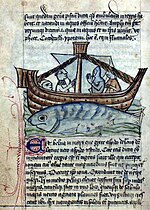Hafgufa (Old Norse: haf "sea" + Old Norse: gufa "steam"; "sea-reek"; "sea-steamer") is a sea creature, purported to inhabit Iceland's waters (Greenland...
35 KB (2,642 words) - 02:11, 3 August 2024
greatest whale in the world, and hafgufa, who bore all the monsters in the sea. The rocks had surely been the nose of Hafgufa; the island, Lyngbakr; and Ögmundr...
3 KB (319 words) - 08:46, 6 August 2023
in Celtic mythology Devil Whale, a demonic whale the size of an island Hafgufa, a whale of fabulous size, described as a sjóskrímsli 'sea monster' together...
14 KB (1,462 words) - 03:25, 12 July 2024
of these include the aspidochelone, Fastitocalon, Jasconius, Lyngbakr, Hafgufa, and various accounts of the kraken. The phrase is sometimes incorrectly...
2 KB (191 words) - 05:20, 10 July 2024
However, the group had safely sailed through the jaws of the Sea-Reek (hafgufa), the other monster that Ögmundr had sent by magic to intercept the party...
13 KB (1,519 words) - 01:37, 23 May 2024
camp for recent arrivals, a Viking-Age woman describes a sea monster, Hafgufa. Lars illegally buys temproxate from a neighbour, Nabo. Ingrid wants to...
49 KB (2,856 words) - 03:31, 5 July 2024
26:00 ff.). In the Icelandic Sagas, Aspidochelone is known by the names Hafgufa and Lyngbakr. In the folklore of the Inuit of Greenland, there was a similar...
22 KB (3,160 words) - 17:14, 8 August 2024






